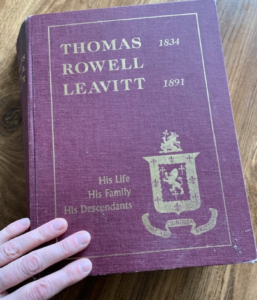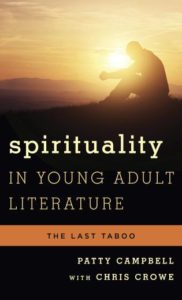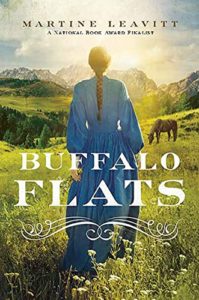A guest post by Martine Leavitt, introducing her novel Buffalo Flats, which is being published in April by Margaret Ferguson Books.
 Thomas Rowell Leavitt, my husband’s great-grandfather, came to Canada with Charles Ora Card in 1887, at the behest of President Brigham Young, to establish a colony of Saints in the British Northwest Territories. When Thomas died of the flu at the age of 57, his family recorded their memories of him. They briefly recorded their own life histories as well, and their children and theirs did the same. The histories were lovingly collected, edited and bound into what Leavitts fondly call the “big red book.”
Thomas Rowell Leavitt, my husband’s great-grandfather, came to Canada with Charles Ora Card in 1887, at the behest of President Brigham Young, to establish a colony of Saints in the British Northwest Territories. When Thomas died of the flu at the age of 57, his family recorded their memories of him. They briefly recorded their own life histories as well, and their children and theirs did the same. The histories were lovingly collected, edited and bound into what Leavitts fondly call the “big red book.”
From the first time I read the big red book, cover to cover, I was deeply moved by these simple, sincere accounts, and I determined that one day I would write a fictional story inspired by them. Of course, I knew I couldn’t tell the story authentically without including the religious beliefs and culture that motivated all the pioneers’ efforts and actions. I could hear my ancestors rolling over in their graves if I tried to tell their story separate from their faith.
But that gave me pause, and for a number of reasons.
Marilynne Robinson said in an interview with the Washington Post, “People say to me ‘I’m religious, I’d like to write about religion, but everybody would hate it, nobody would read it.’ You’re a coward, is what you feel like saying. Faith is one of the great structuring elements in civilization. It has fascinated the best minds of many centuries. If it happens to fascinate yours also, there is no reason to be afraid. Of what, a bad review?”
Of course, Robinson won the Pulitzer Prize, which I imagine makes one immune to bad reviews. For my part, good reviews have been my consolation in a life of writerly poverty.
 Then I read the insightful text, Spirituality in Young Adult Literature, written by Patty Campbell and Dr. Chris Crowe. From it I learned that, while authors of young adult literature these days feel free to address virtually any given subject matter, including topics that explore all kinds of sexual, ethical, social and psychological issues of the day, there is one last taboo: spirituality.
Then I read the insightful text, Spirituality in Young Adult Literature, written by Patty Campbell and Dr. Chris Crowe. From it I learned that, while authors of young adult literature these days feel free to address virtually any given subject matter, including topics that explore all kinds of sexual, ethical, social and psychological issues of the day, there is one last taboo: spirituality.
Finally, I read a quote from an interview with young-adult author Pete Hautman in VOYA magazine: “I am not a person of faith, but I think that the topic of religion is underserved in YA literature. Most writers want nothing to do with it because any mention of religion in any context is a sales killer.”
Bad reviews. Taboo. Sales killer. This all did not sound good to me. Not to mention – could I even find a publisher for such a book? Bad reviews, taboo-breaking and dead sales were moot if you can’t publish the book.
But surely it was worth a try. My heart had been turned to the fathers! Also, it seemed to me that religious belief, or at least religious inquiry, is undoubtedly a part of many young people’s lives. I hear their music idols and sports heroes publicly declaring their belief in God all the time. And if it were true that many or some young people respectfully consider religion and religious questions, then the picture of American religious life that emerges from YA literature is not representative. And perhaps it should be. Perhaps young readers of faith should have the opportunity to find themselves on the page in a good story that doesn’t make them feel ashamed of their beliefs. Perhaps young readers outside a faith community could increase in tolerance and inclusivity if they saw faith traditions represented in a positive light.
I decided that if I was going to do it, I wasn’t going to hold back. I wasn’t going to be shy. Almost all my books touch on faith questions: the afterlife, or the purpose of suffering, or the existence of God… I have never received any negative feedback from critics or readers in general about this. But this book – this one had to be seeped in belief, my personal deeply held beliefs.
I began the way I always begin – not with an agenda. I would not set out to moralize or convert. Like all my previous books, I would set out to tell a good story, to entertain. I would do my best to create a relatable and multi-faceted character. I would work to make it my very best writing.
Katherine Paterson said, “The challenge for those of us who care about our faith and about a hurting world is to tell stories which will carry the words of grace and hope in their bones and sinews and not wear them like fancy dress.” Yes. I would try to revise away the fancy dress, and leave behind the grace and hope. One writer of faith said in an interview that she wrote stories of faith to, “inspire children, deepen their faith, or help them live a better life.” There is surely a place for books of that nature, but that was not my intention. I would leave the deepening of faith for better people than I. Grace, hope, and a good story. That’s what I was going for.
 An honest fictional representation of faith may include moments of doubt or questioning during times of suffering. My character would have that moment. That would make it into the book. But also an honest representation of my faith would include absolute devotion, the sense of the miraculous everywhere you look, the reality of angels and healings, and a profound experience with the love of God. That is my honest representation. If one, then the other.
An honest fictional representation of faith may include moments of doubt or questioning during times of suffering. My character would have that moment. That would make it into the book. But also an honest representation of my faith would include absolute devotion, the sense of the miraculous everywhere you look, the reality of angels and healings, and a profound experience with the love of God. That is my honest representation. If one, then the other.
Fair’s fair.
So – found someone to publish it. Come what may and love it.
 Martine Leavitt is the author of award-winning books for young readers, including Calvin (winner of the Governor General’s Award), My Book of Life by Angel (finalist for the Los Angeles Times Book Prize and winner of the Canadian Library Association Young Adult Book of the Year) and Keturah and Lord Death (finalist for the National Book Award). She received AML Awards in Young Adult Literature for The Dragon’s Tapestry and The Prism Moon (1993) and The Taker’s Key (1998). She teaches in the MFA program in Writing for Children and Young Adults at Vermont College of Fine Arts, where she is serving as the Katherine Paterson Endowed Chair. Martine lives in High River, Alberta.
Martine Leavitt is the author of award-winning books for young readers, including Calvin (winner of the Governor General’s Award), My Book of Life by Angel (finalist for the Los Angeles Times Book Prize and winner of the Canadian Library Association Young Adult Book of the Year) and Keturah and Lord Death (finalist for the National Book Award). She received AML Awards in Young Adult Literature for The Dragon’s Tapestry and The Prism Moon (1993) and The Taker’s Key (1998). She teaches in the MFA program in Writing for Children and Young Adults at Vermont College of Fine Arts, where she is serving as the Katherine Paterson Endowed Chair. Martine lives in High River, Alberta.

.
Good luck! The market does need more of this, for sure. Maybe you’ll help prove that.
That is so true! Personally I cannot wait to read it! It takes real courage to broach the subject of religion today. Even if only other people of faith choose to read it, I’m sure it will bless their lives!
I am enthralled by the landscape Martine presented here of YA literature and the gap this book might begin to fill. History, and perhaps the present, are incomplete without faith. I remember spending entire semesters back in college studying history and having to learn the relevant religions to understand what was really happening. I can’t wait to see the reaction to this novel.
I’m looking forward to reading this book!
You have to really reach to write a taboo book these days, but it sounds like you might’ve done it! I’m so excited to read it!!!
You’re amazing! I’m excited to read it!
Sounds like an fascinating read!
If this book is anything like the others I’ve read by Martine, it will be an experience that few books can deliver. Preordered.
I’m looking forward to reading this book! Your ability to portray the reality and nuance of life’s complexity and the struggles that various groups must navigate has always spoken to me. I’m excited to see how you approach this topic in more depth.
I’m looking forward to this book so much!!! I can’t wait to see how Martine Leavitt includes this topic in her book.
Can’t wait to read it! I’ve read so many of her books start to finish without ever putting it down. I get pulled in, and am fully immersed until the end.
I’m sure this will be another monster success…I just love Martine Leavitt’s books!!